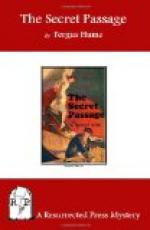Then he was surprised to receive a letter from Mrs. Herne, stating that she had returned to her place at Hampstead, and asking him to call. “I understand from Mr. Clancy,” wrote Mrs. Herne, “that you wish to see me in connection with the death of my poor friend. I shall beat home to-morrow at four.” Then followed the signature, and Jennings put away the note with a rather disappointed feeling. If he was right in suspecting Mrs. Herne, she certainly felt little fear, else she would have declined to see him. After all, his supposition that the two women and the four men formed a gang of coiners, who worked in the unfinished house, might turn out to be wrong. “But I’ll see Mrs. Herne and have a long talk with her,” said Jennings to himself. “And then I’ll show the knife to Cuthbert Mallow. Also I may examine the unfinished house. If coiners have been there, or are there, I’ll soon find out. Mallow hunting for ghosts, probably, made only a cursory examination. And I’ll take Drudge to Hampstead with me.”
Drudge was a detective who adored Jennings and thought him the very greatest man in England. He was usually employed in watching those whom his superior suspected, and Jennings could always rely on his orders being honestly executed. In this instance Drudge was to wait some distance from the house of Mrs. Herne until Jennings came out again. Then on the conversation which had taken place would depend further orders. The man was silent and lean, with a pair of sad eyes. He followed Jennings like a dog and never spoke unless he was required to answer a question.
Mrs. Herne did not possess a house of her own, which struck the detective as strange, considering she appeared to be a wealthy woman. She always wore costly dresses and much jewellery, yet she was content with two rooms, one to sit in and the other to sleep in. Certainly the sitting-room (which was all Jennings saw) was well furnished, and she apparently thoroughly appreciated the luxuries of life. There was a bow-window which commanded a fine prospect of the Heath, and here Mrs. Herne was seated. The blinds were half-way down, so that the brilliant sunlight could not penetrate into the somewhat dusky room. When the detective entered Mrs. Herne excused the semi-darkness. “But my eyes are somewhat weak,” she said, motioning him to a seat. “However, if you wish for more light—” she laid her hand on the blind-cord.
“Not on my account,” said Jennings, who did not wish to appear unduly suspicious. “I am quite satisfied.”
“Very well, then,” replied Mrs. Herne, resuming her seat and crossing her delicate hands on her lap. “We can talk. I am at your orders.”




